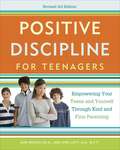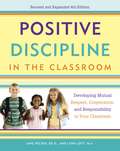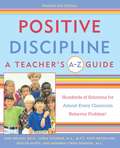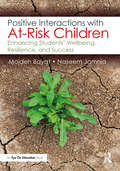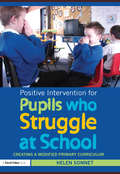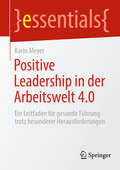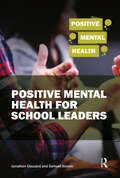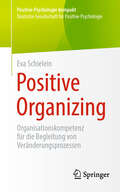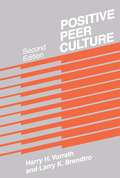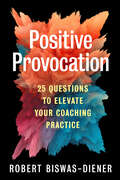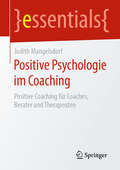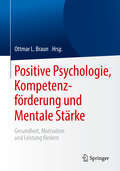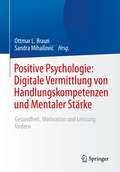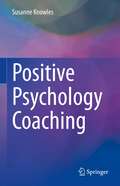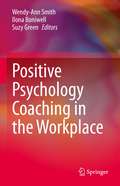- Table View
- List View
Positive Discipline for Teenagers, Revised 3rd Edition: Empowering Your Teens and Yourself Through Kind and Firm Parenting
by Jane Nelsen Lynn LottA Positive Approach To Raising Happy, Healthy and Mature Teenagers Adolescence can be a time of great stress and turmoil--not only for kids going through it, but for their parents as well. It's normal for teens to explore a new sense of freedom and to redefine the ways in which they relate to their parents, and that process can sometimes leave parents feeling powerless, alienated, or excluded from their children's lives. These effects can be magnified even further in this modern age of social networks, cell phones, and constant digital distraction. This newly revised and updated edition of Positive Discipline for Teenagers shows parents how to build stronger bridges of communication with their children, break the destructive cycles of guilt and blame that occur in parent-teen power struggles, and work toward greater mutual respect with their adolescents. At the core of the Positive Discipline approach is the understanding that teens still need their parents, just in different ways--and by better understanding who their teens really are, parents can learn to encourage both their teens and themselves, and instill good judgment without being judgmental. The methods in this book work to build vital social and life skills through encouragement and empowerment--not punishment. Truly effective parenting is about connection before correction.Over the years, millions of parents have come to trust Jane Nelsen's classic Positive Discipline series for its consistent, commonsense approach to raising happy, responsible kids. This new edition is filled with proven, effective methods for coping with such parenting challenges as: -Fostering truly honest discussions with your teen-Helping your teen handle the online world -Turning mistakes into opportunities-Keeping your sanity while raising your teen--and making sure your own teenage issues aren't weighing you down-Teaching your teen how to pursue the goal that make them happy...and a few that make you happy too (like chores)-Making sure you're on your teen's side, and that they know that-Avoiding the pitfalls of excessive control and excessive permissiveness
Positive Discipline in the Classroom: Developing Mutual Respect, Cooperation, and Responsibility in Your Classroom (Positive Discipline)
by Jane Nelsen Lynn Lott H. Stephen GlennThe Acclaimed Bestseller That Can Improve Your Classroom Experience Forever!Over the years, millions of parents have come to trust the classic Positive Discipline series for its consistent, commmonsense approach to child rearing. Hundreds of schools also use these amazingly effective strategies for restoring order and civility to today's turbulent classrooms. Now you too can use this philosophy as a foundation for fostering cooperation, problem-solving skills, and mutual respect in children. Imagine, instead of controlling behavior, you can be teaching; instead of confronting apathy, you will enjoy motivated, eager students! Inside, you'll discover how to: ·Create a classroom climate that enhances academic learning ·Use encouragement rather than praise and rewards ·Instill valuable social skills and positive behavior through the use of class meetings ·Understand the motivation behind students' behavior instead of looking for causes ·And much more! Over 1 million Positive Discipline books sold!From the Trade Paperback edition.
Positive Discipline: Hundreds of Solutions for Almost Every Classroom Behavior Problem!
by Jane Nelsen Linda Escobar Kate Ortolano Roslyn Duffy Deborah Owen-SohockiTake Back the Classroom and Make a Positive Difference in Your Students' Lives Many teachers today are facing problems and discipline issues they never dreamed of when they decided to become teachers. Combine violence, behavioral disorders, and downright defiant attitudes from students with the age-old problems of bullying, poor attendance, and more, and the mix is positively lethal. However, there are effective, positive strategies for restoring order and turning the teacher-student relationship into one of mutual respect. Applicable to all grade levels, this comprehensive A to Z guide addresses modern-day problems and practical solutions for establishing an effective learning environment. Inside, you'll discover: ·The 17 fundamental tools of positive discipline ·Real-life stories of proven positive discipline strategies ·Suggestions for establishing and maintaining respectful, nurturing relationships with students ·And much more! "Overcome obstacles and get back to why you became a teacher in the first place: to empower students with confidence, self-respect, and resourcefulness. " --Bill Scott,principal, Birney Elementary School, Murietta, Georgia "An inspiring, information-packed book. All teachers--from those just beginning to those with many years of experience--will find the tools of positive discipline easy to use. " --Phillip Harris, Ed. D. ,director, Center for Professional Development and Services, Phi Delta Kappa International
Positive Interaction Skills: A Group Therapy Manual
by Robin DynesThis practical, photocopiable manual provides group leaders with a flexible programme to teach interaction skills that can be adapted to a wide variety of groups, situations and needs. The programme will benefit anyone who lacks adequate skills or who has difficulty interacting with other people at home, socially or at work, for example adults with very few or no formal qualifications, people with depression or schizophrenia, young people in schools or people with learning disabilities. The book is filled with workable ideas and the sessions are designed to be used independently as required to meet identified needs. Full guidance notes for facilitators, session plans, handouts and activity guidelines are provided and this will be an invaluable resource for anyone wanting to run an interaction skills programme.
Positive Interactions with At-Risk Children: Enhancing Students’ Wellbeing, Resilience, and Success
by Mojdeh Bayat Naseem JamniaFind the tools and knowledge you need to build resilience in all children from an early age through appropriate interactions and conversations. Presenting a wide range of research in an accessible format, Positive Interactions with At-Risk Children explains how to understand and assess behaviors in the context of children’s developmental stages. This book introduces Bayat's original Resilience-based Interaction Model (RIM), which combines behavioral and emotion-based theories of development to provide practical steps for early childhood teachers and professionals. RIM features research-based practices, including relationship building, behavior guidance, body-mind exercises for both teachers and students, as well as strategies to promote strengths of character in children and aid future learning. Ideal for new and veteran educators alike, Positive Interactions with At-Risk Children is an invaluable guide to early years behavior.
Positive Intervention for Pupils who Struggle at School: Creating a Modified Primary Curriculum
by Helen SonnetPositive Intervention for Pupils who Struggle at School provides the resources and information primary teachers need to ensure a happy and effective school experience for all children, particularly those who are seriously struggling. This tried and tested intervention is designed specifically for those children who have been through all the standard interventions, to no avail, and who are now in danger of being excluded.Explaining the thinking behind the suggested modified curriculum, this innovative book considers the reasons why certain children experience difficulties and looks at how this curriculum addresses their needs and enables them to develop personal, social and emotional skills. The activities are chosen to develop and enhance skills for learning, including listening, speaking, concentrating, a positive disposition and a willingness to take on new challenges. Helen Sonnet demonstrates how success has been achieved through this strategy and provides valuable information to help teachers to set up similar groups in their own schools, including how to: ensure firm foundations for the group select the children who will benefit most establish the structures and routine of a successful group assess the children’s progress reintegrate children into their mainstream classes effectively. In line with government initiatives this important and effective intervention strategy can make the world of difference, giving teachers new, proven strategies to enable them to support children who are struggling in mainstream primary schools.
Positive Leadership in der Arbeitswelt 4.0: Ein Leitfaden für gesunde Führung trotz besonderer Herausforderungen (essentials)
by Karin Meyer„Immer mehr, schneller und mit möglichst geringen Ressourcen“ lautet oftmals die Devise in der Arbeitswelt 4.0. Dabei ist es möglich, Unternehmens- und Mitarbeiterinteressen bestmöglich zu vereinen – also, Unternehmen (noch) erfolgreicher zu machen und gleichzeitig Wohlbefinden und Gesundheit der Mitarbeitenden zu stärken. Denn ökonomisches und soziales Wohlergehen können sich sinnvoll komplementär ergänzen. Beleuchtet werden daher wesentliche Grundlagen für Wohlbefinden, Gesundheit und unternehmerischen Erfolg – ebenso wie die Umsetzung in die Praxis mittels Positive Leadership gelingen kann.
Positive Mental Health for School Leaders (Positive Mental Health)
by Jonathan Glazzard Samuel StonesThe mental health of school leaders and managers is just as important as the well-being of those they teach and support. Recent research reveals some alarming statistics, including that 56% of senior leaders have experienced mental ill health in the last year. This book examines a range of relevant issues including workload, inspections, partnerships and approaches to leadership and management in order to address some of these concerns and provide comprehensive guidance and workable, evidence-informed strategies to support those with leadership roles in schools and colleges.
Positive Organizing: Organisationskompetenz für die Begleitung von Veränderungsprozessen (Positive Psychologie kompakt)
by Eva SchieleinVermittelt Ihnen Grundkenntnisse der systemischen Organisationstheorie für eine wirksame Begleitung von organisationalen Veränderungsprozessen. Mit Konzepten, die auf Menschen und ihre Psychodynamiken fokussieren, kommt man bei der Arbeit mit Organisationen nicht weit. Statt über die Grenzen der Positiven Psychologie zu lamentieren, verknüpft dieses Buch den potenzialorientierten Ansatz des Positive Organizational Scholarship (POS) mit Grundlagen der systemischen Organisationstheorie, um Transformationen in Organisationen wirksam zu begleiten. Während sich mit ‚Positive Leadership‘ bereits vor Jahren ein radikal neues Verständnis von Führung etabliert hat, definiert ‚Positive Organizing‘ den Prozess des Organisierens neu. Positive Organizing wird als Prozessmodell vorgestellt, das Berater:innen und Führungskräfte einsetzen können, um Organisationen in ihrer Fähigkeit zu stärken, selbstorganisiert und potenzialorientiert Veränderungen zu bewirken. Zu den Zielgruppen: Führungskräfte, Berater:innen, Coaches, und alle, die Veränderungen in Organisationen begleiten.
Positive Peace in Schools: Tackling Conflict and Creating a Culture of Peace in the Classroom
by Hilary Cremin Terence BevingtonPositive Peace in Schools offers a fresh and challenging perspective on the question of conflict, violence and peace in schools. Drawing on the most up-to-date theory and research from the field of peace and conflict studies, this book provides readers with a strong understanding of the concept of positive peace, and how the dimensions of peace-keeping, peace-making and peace-building can be robustly applied in schools. This accessible book challenges educators everywhere to reconsider the nature of direct and indirect violence in schools, and the structural and cultural factors that sustain it. It engages with global traditions of harmony and balance that are often neglected in Western notions of liberal securitised peace, in order to suggest a model for schools that integrates inner and outer peace. The book also includes practical sections that outline restorative approaches to discipline, peer mediation, circle learning, and classroom activities to promote mindfulness, inclusion and wellbeing. Taken together, these provide a philosophy and a highly effective framework for building conflict literacy and a culture of peace in schools.
Positive Pedagogy across the Primary Curriculum
by Jonathan BarnesThis book offers a positive approach to thematic cross-curricular teaching. Within a clear focus on humanitarian and inclusive values, it offers guidance on robust learning in the subject disciplines within a set of highly involving themes. Its fundamental aim is the mental, physical, social and intellectual wellbeing of children and their teachers. Discover how your teaching can support genuine age-appropriate engagement in contemporary and global issues like shared values, anti-racism, social inequalities and environmental concerns. Learn ways of drawing from a wider, inclusive and motivating curriculum without compromising progression in subject-specific learning. Case studies and clear guidance on planning and assessment offer strong practical advice to support you in setting the foundations for smart, informed and relevant primary school teaching. Jonathan Barnes is a Visiting Senior Research Fellow at Canterbury Christ Church University and a National Teaching Fellow.
Positive Pedagogy across the Primary Curriculum
by Jonathan BarnesThis book offers a positive approach to thematic cross-curricular teaching. Within a clear focus on humanitarian and inclusive values, it offers guidance on robust learning in the subject disciplines within a set of highly involving themes. Its fundamental aim is the mental, physical, social and intellectual wellbeing of children and their teachers. Discover how your teaching can support genuine age-appropriate engagement in contemporary and global issues like shared values, anti-racism, social inequalities and environmental concerns. Learn ways of drawing from a wider, inclusive and motivating curriculum without compromising progression in subject-specific learning. Case studies and clear guidance on planning and assessment offer strong practical advice to support you in setting the foundations for smart, informed and relevant primary school teaching. Jonathan Barnes is a Visiting Senior Research Fellow at Canterbury Christ Church University and a National Teaching Fellow.
Positive Peer Culture
by D.E.C. EversleyThis revision of an important and path-breaking work holds to its central argument that troubled young people can develop self-worth, significance, dignity, and responsibility only through commitment to the positive values of helping and caring for others.An enlarged and revised edition of the authors' pioneering work on building positive youth culture, Positive Peer Culture retains the practical orientation that made the original attractive to teachers and youth workers, while adding new material on positive peer culture (PPC) in schools and community settings, research on PPC, and guidelines for maintaining program effectiveness and quality. Concepts of positive peer culture have been applied in a wide variety of educational and treatment settings including public and alternative schools, group homes, and residential centers. Vorrath and Brendtro describe specific procedures for getting youth "hooked on helping" through peer counseling groups, and for generalizing caring behavior beyond the school or treatment environment through community-based service learning projects.The authors contend that the young people who populate our nation's schools are in desperate need of an antidote to the narcissism, malaise and antisocial life-styles that have become so prevalent, and that this book seeks to provide a way of meeting their increasing cry to be used in some demanding cause. On publication of the first edition, Richard P. Barth, Frank A. Daniels Professor for Human Services Information Policy, School of Social Work, University of North Carolina at Chapel Hill called Positive Peer Culture "a significant contribution to the field."
Positive Provocation: 25 Questions to Elevate Your Coaching Practice
by Robert Biswas-DienerHone your skills and strengthen your practice with this series of twenty-five fresh and provocative questions for reflection that challenge the conventional wisdom in the coaching profession. Like any established profession, coaching is full of unexamined assumptions. These need to be regularly questioned and tested to keep the profession vital and valuable. Coaches need to engage in the same kind of scrutiny and self-examination that offers such powerful benefits to their clients. In Positive Provocation, coaching thought leader Robert Biswas-Diener asks a series of twenty-five provocative and sometimes playful questions that take a fresh look at some of coaching's most cherished beliefs. What if coaches had agendas? Why are ethics so boring? What's so great about interrupting? Can we trust eureka moments? What if we used less empathy? This is not an attack on the coaching profession-Biswas-Diener writes with a light, conversational, and often humorous touch. These are positive provocations, meant to stimulate your curiosity, engage you with the latest research, and invite you to see your practice with new eyes. Biswas-Diener covers philosophies of coaching, communicating with clients, common coaching concepts, coaching interventions, and a big final provocation: should coaching be informed by science? This book will give you a richer understanding of the coaching process, make you more articulate about your own beliefs, and allow you to feel more engaged with the craft.
Positive Psychologie - Erfolgsgarant oder Schönmalerei?
by Michael TomoffPositive Psychologie - Erfolgsgarant oder Schönmalerei? Entdecken Sie die Doppelkante der Positiven Psychologie: Ein Schlüssel zu mehr persönlichem und beruflichem Erfolg oder doch nur eine rosarote Brille? Diplom-Psychologe Michael Tomoff entführt Sie in eine Welt, die sowohl die glänzenden als auch die schattigen Seiten dieser bewegenden Wissenschaft beleuchtet. Das vorliegende Buch ist weit mehr als ein Glücksratgeber. Es ist eine fundierte, kritische und dennoch humorvolle Untersuchung der Positiven Psychologie, die sich sowohl an Lehrer, Eltern, Führungskräfte, Mitarbeiter, Coaches und auch Trainer richtet – egal ob Laien oder Experten. Mit einem klaren Blick auf die wissenschaftliche Basis und die praktische Anwendung beleuchtet der Autor die Mythen und Missverständnisse rund um die Wissenschaft des Wohlbefindens: Macht Geld glücklich? Sind Eltern zufriedener als Kinderlose? Welche Rolle spielen Schuld und Scham bei der Kindererziehung? Wie kann die Positive Psychologie die Schule oder das Unternehmen von morgen unterstützen und formen? Und sollte sie das überhaupt? Durch die elegante, mundgerechte Zusammenfassung aktueller Forschungen, die Vorstellung leicht umsetzbarer Übungen, Tools und Interventionen sowie die Erörterung der Relevanz der Positiven Psychologie in verschiedenen Kulturen und Lebensbereichen bietet dieses Buch einen umfassenden Überblick und praktische Anleitungen. Erfahren Sie, wie die Positive Psychologie in Schulen, Unternehmen und im persönlichen Leben konkret Anwendung finden kann, und welche Vorteile sie bietet. Michael Tomoff ist nicht nur ein erfahrener Psychologe, sondern auch ein leidenschaftlicher Botschafter für das Potenzial der Positiven Psychologie, das Wohlstand und Wohlbefinden zu fördern und dabei realistisch und kritisch zu bleiben. Mit seiner Ausbildung an der University of California in Berkeley und seiner breiten Erfahrung als Trainer, Berater und systemischer Coach bringt ereine einzigartige Perspektive und eine Fülle von praktischen Einsichten in dieses fesselnde Werk ein. In seinem Blog „Was Wäre Wenn“ gibt er wichtige Impulse zu einer Vielzahl von Themen wie Dankbarkeit, Komplimenten, dem Nein-Sagen, Grenzensetzen oder auch stärkenfokussierter Führung.
Positive Psychologie im Coaching: Positive Coaching für Coaches, Berater und Therapeuten (essentials)
by Judith MangelsdorfDieses essential bietet eine Einführung in die wachstumsorientierte Prozessbegleitung durch Ansätze und Methoden der Positiven Psychologie. Es gibt einen Überblick über die Grundlagen des Positive Coachings in Ergänzung zu anderen lösungsorientierten Verfahren. Sie lernen sowohl die theoretischen Grundlagen des Positive Coachings als auch die konkreten Ansätze zur wachstumsorientierten Begleitung in den verschiedenen Phasen des Coachingprozesses kennen. Anhand wissenschaftlicher Konzepte der Positiven Psychologie und praktischer Methoden wird dargestellt, wie aktuelle Herausforderungen von Klienten genutzt werden können, um zu Potenzialentfaltung und persönlichem Wachstum beizutragen.
Positive Psychologie in Bildungseinrichtungen: Konzepte und Strategien für Fach- und Führungskräfte (essentials)
by Michaela BrohmMichaela Brohm stellt Konzepte und Strategien zur positiven Energetisierung von Individuen und Organisationen im Bildungsbereich vor. Sie zeigt, wie sich das energetische Niveau einer Bildungsorganisation durch positiv-psychologische Maßnahmen heben lässt, und gibt Impulse für einen motivierenden, Mensch und Organisation belebenden Führungsstil. Wertvolle Anregungen, inspirierende Beispiele und ein umfassendes Inventar zu den zentralen Elementen positiven Führungsverhaltens fordern zum Transfer in die Praxis heraus.
Positive Psychologie in der Erziehung: Für Eltern und andere Erziehende (essentials)
by Michael TomoffMichael Tomoff bietet einen #65533;berblick #65533;ber die M#65533;glichkeiten, die der neue Wissenschaftszweig der Positiven Psychologie Menschen bei der Erziehung bieten kann. In diesem essential gibt der Autor sowohl Impulse f#65533;r eine positivere Erziehung mithilfe von Erkenntnissen aus der Positiven Psychologie als auch eine Perspektive, was Eltern oder Erzieher f#65533;r sich tun k#65533;nnen, um den teilweise sehr gro#65533;en Belastungen Stand zu halten oder sie subjektiv zu vermindern.
Positive Psychologie, Kompetenzförderung und Mentale Stärke: Gesundheit, Motivation und Leistung fördern
by Ottmar L. BraunDieses Buch veranschaulicht Personalentwicklungsmaßnahmen zur Förderung von Selbstkompetenzen, Sozialkompetenzen, Methodenkompetenzen und mentaler Stärke im Rahmen der Positiven Psychologie. Im Mittelpunkt steht das Modell des Positiven Selbstmanagements mit folgenden drei großen Komponenten: Methoden und Techniken der Positiven Psychologie und Kompetenzen wie finanzielle Selbstmanagementkompetenz, Entscheidungskompetenz, Resilienztechniken, Vitalität, Kompetenzen in Smalltalk und Networking, Präsentationskompetenz, die Reduzierung dysfunktionaler Kognitionen, Problemlösekompetenz und Zielklarheit führen zur mentalen Stärke.Mentale Stärke: Diese setzt sich aus Selbstwirksamkeitserwartungen, Optimismus, Hoffnung, Resilienz, Selbstvertrauen und der Fähigkeit zur Emotionsregulation zusammen. Die mentale Stärke hat langfristig positive Folgen, u.a. gehören dazu Arbeitszufriedenheit, Lebenszufriedenheit, psychische Gesundheit, ein geringeres Stresserleben und eine geringere Tendenz zum Burnout. Basierend auf zahlreichen empirischen Studien , die das Modell belegen und die Wirksamkeit von Trainingsveranstaltungen bestätigen, erhält jeder Leser wertvolle Hinweise für das Arbeitsleben – auch bezüglich der Anwendung des Quizbrettspiels "CareerGames - spielend trainieren", das in den Trainings zur Transfersicherung zum Einsatz kam. Zielgruppen: Personalverantwortliche, Trainer, Anwender und Studierende bzw. alle diejenigen, die Selbstmanagementkompetenzen, Sozial- und Methodenkompetenzen und Mentale Stärke in Organisationen erfolgreich trainieren wollen. Zum Herausgeber: Prof. Dr. Ottmar L. Braun, Studium der Psychologie und Promotion zum Dr. phil. an der Universität Bielefeld. Derzeit Professor im Arbeitsbereich Sozial-, Umwelt und Wirtschaftspsychologie an der Universität Koblenz-Landau.
Positive Psychologie: Gesundheit, Motivation und Leistung fördern
by Ottmar L. Braun Sandra MihailovićDieses Buch veranschaulicht die Durchführung von Seminaren und Trainings im digitalen Online-Format zur Förderung von Mentaler Stärke, Selbstkompetenzen, Sozialkompetenzen und Methodenkompetenzen im Rahmen der Positiven Psychologie. Im Mittelpunkt steht das Modell des Positiven Selbstmanagements mit folgenden drei großen Komponenten: Methoden und Techniken der Positiven Psychologie und Kompetenzen wie Zeit- und Energiemanagement, Ziele und Motivation, Vitalität, Small-Talk und Networking, Teamfähigkeit, Gesprächsführung und wertschätzende Kommunikation, Konfliktmanagement, Planungstechniken, Selbst-PR und Problemlösekompetenz führen zur mentalen Stärke.Mentale Stärke: Diese setzt sich aus Selbstwirksamkeitserwartungen, Optimismus, Hoffnung, Resilienz, Selbstvertrauen und der Fähigkeit zur Emotionsregulation zusammen.Die mentale Stärke hat langfristig positive Folgen, u.a. gehören dazu Arbeitsfähigkeit, Lebenszufriedenheit, Glück, Aufblühen und ein geringeres Stresserleben. Basierend auf zahlreichen empirischen Studien, die das Modell belegen und die Wirksamkeit der Interventionen bestätigen, erhält jeder Leser wertvolle Hinweise für das Arbeitsleben und zur praktischen Durchführung von digitalen online-Trainingsveranstaltungen. Zielgruppen: Personalverantwortliche, Trainer, Anwender und Studierende bzw. alle diejenigen, die Selbstmanagementkompetenzen, Sozial- und Methodenkompetenzen und Mentale Stärke in Organisationen erfolgreich trainieren wollen. Herausgeber: Prof. Dr. Ottmar L. Braun, Studium der Psychologie und Promotion zum Dr. phil. an der Universität Bielefeld. Derzeit Professor im Arbeitsbereich Sozial-, Umwelt und Wirtschaftspsychologie an der Universität Koblenz-Landau, Campus Landau. Geschäftsführer der CareerGames GbR. Dipl.-Psych. Sandra Mihailović, Studium der Psychologie, langjährige Tätigkeit in einem Automobilkonzern in der Organisations- und Führungskräfteentwicklung. Derzeit selbständige Trainerin, Beraterin und Coach, Expertin für online-Trainings und Mentale Stärke. Geschäftsführerin der CareerGames GbR.
Positive Psychology Coaching
by Susanne KnowlesThis book provides evidence for coaching from psychology perspectives, aiming to inform academics, researchers and students of the efficacy of positive psychology coaching practice for both individuals and organizations. It integrates three areas of research, providing a multifaceted analysis of coaching from traditional psychology, positive psychology, and coaching research findings. Finally, it introduces a comprehensive new model of coaching (COACH) based on the psychological and educational foundations of coaching, explaining its effectiveness and adaptability across settings and individuals.
Positive Psychology Coaching in the Workplace
by Suzy Green Ilona Boniwell Wendy-Ann SmithThis research-to-practice text explores how coaching can support thriving in the workplace. It focuses on positive psychology coaching in the workplace in relation to: the convergence with organisational psychology and coaching psychology, professional and ethical practices, resilience and wellbeing, team and systemic approaches, leadership, tools of intervention, convergence of clinical interventions and virtuousness, and the future of thriving workplaces. The chapter contributions represent a truly international scholarship and bring together complementary perspectives from the fields of positive psychology, coaching psychology, organisational psychology, organisational scholarship, neuroscience, education and philosophy. Written in a scholarly but accessible style, this text is of interest to a wide readership, including academics, professionals and postgraduate students of positive psychology, organisational psychology, counselling and coaching psychology, human resource management, mental health, health and social welfare. "Smith, Boniwell and Green have brought together an outstanding collection of thought leaders from the field of positive psychology coaching to craft an in-depth exploration of the contribution positive psychology can make to delivering transformation change through coaching conversations. A fascinating read, full of evidence and insight". Jonathan Passmore Professor of Coaching & Behavioural Change Director Henley Centre for Coaching, Henley Business School
Positive Psychology Perspectives on Foreign Language Learning and Teaching
by Danuta Gabryś-Barker Dagmara GałajdaThis book introduces readers to the principles of a fairlynew branch of psychology - positive psychology - and demonstrates how they canbe applied in the context of second language acquisition in a naturalenvironment and in instructed foreign language (FL) learning. It focuses bothon the well-being and success of the learner and the professional and personalwell-being of the teacher. Further, the book stresses the importance of thepositive emotions and character strengths of those involved in the process oflanguage learning and teaching, as well as the significant role played byenabling institutions such as school and, at the micro-level, individual FLclasses.
Positive Psychology and Positive Education in Asia: Understanding and Fostering Well-Being in Schools (Positive Education)
by Ronnel B. King Allan B. I. Bernardo Imelda Santos CaleonThis book explores students’ and teachers’ well-being from positive psychology and education perspectives and showcases interventions that optimize well-being in the school context. The book also covers crucial positive psychology and education topics/themes including character strengths, gratitude, growth mindset, grit, resilience, positive emotions, and well-being among others. The chapters include reviews and empirical research based on diverse methodologies, such as correlational, experimental, quasi-experimental, intervention, longitudinal, and qualitative approaches from six different Asian sociocultural contexts—Singapore, Hong Kong, Mainland China, Israel, Macau, and Philippines. All the chapters, provide practical pointers for teachers and educators who aim to nurture well-being in schools.
